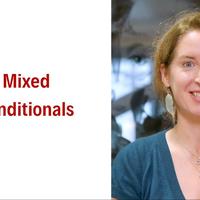Mixed conditionals - English In A Minute - YouTube
Hi! I'm Georgina from BBC Learning English.
In today's lesson, we're looking at mixed conditionals.
We usually use mixed conditionals
to talk about a past imaginary situation
that has a present imaginary result.
For example:
If I had eaten breakfast, I wouldn't be hungry now.
The first phrase
uses the same structure as the third conditional
– if + past perfect.
This is because it is a past imaginary situation.
It's not true. I didn't eat breakfast.
The second phrase
uses the same structure as the second conditional
– would + infinitive (no to).
This is because it is a present imaginary result.
It's not true. I am hungry because I didn't eat breakfast.
Don't forget to put the comma in after the 'if' clause.
Bye for now!

